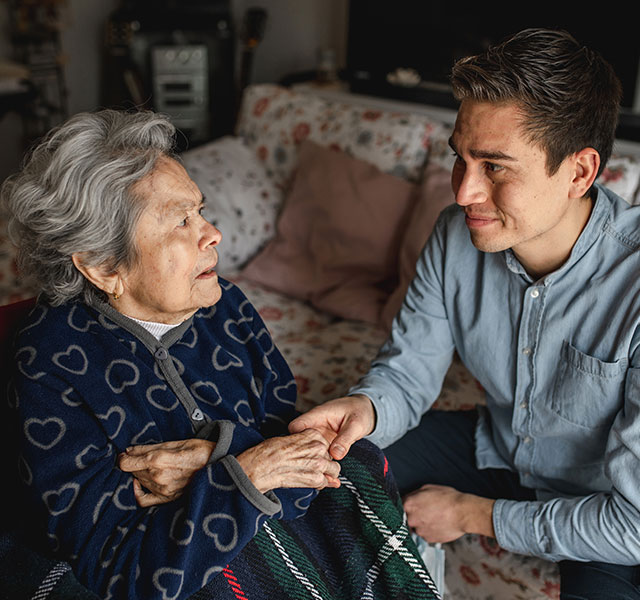If you have a loved one with dementia, then you know that caregiving for them can be a frustrating experience. Watching someone you care about struggle to remember how to do their daily routine or details about their life can be heartbreaking. Shawn Bennis, MSN, RN, CHC, a faith community nurse and family caregiver specialist at Henry Ford Health, shares how caregivers for patients with memory or neurodegenerative conditions can provide the best care to others while still maintaining their own mental health and self-care practices.
“Everyone has the same underlying concerns when it comes to caregiving,” says Bennis. “It can be really rewarding work, but also very overwhelming at times. People just want to make sure they are making the right choices to help their loved ones.”
Here, Bennis shares several things that you can do as a caregiver to someone with dementia to help them as much as you can:
1. Start Care Conversations Sooner Rather Than Later
As you loved ones get older, start having conversations about advance directives and their healthcare wishes. “Having these things planned out in advance will allow you to make clearheaded decisions in regard to their care – even if they are unable to communicate on their own,” says Bennis. “This also avoids being reactive instead of proactive in your decision making.”
Make sure to get proxy access to your loved one’s online medical records to allow you to legally be involved in their care. This way, you can help them keep track of their doctor’s appointments and view test results. You might ask to attend routine physical appointments with your loved one as an easy start to being more involved in their care.
2. Meet People Where They Are At
For many patients with Alzheimer’s or other forms of dementia, mood changes are normal. Just remember, dementia is a disease that affect your mind and your loved one may not always seem like themselves.
“I recommend that caregivers lower their expectations for loved ones,” says Bennis. “Watching a parent or grandparent lash out or have a dramatic change in behavior can be surprising and frustrating. Instead, be aware of behavior changes and evaluate if something else could be impacting how they are acting. For example, anger or irritability could be a sign that there is something else health-wise that is making your loved one uncomfortable. If you suspect something else is going on, contact the doctor.”
3. Rehearse Your Responses

The Henry Ford C.A.R.E. Program
When you are alone, plan out how you might respond in certain situations with your loved one. Sometimes it can be difficult to respond calmly in the moment.
“Ask yourself – what can I do to prevent my loved one from frustrating me?” says Bennis. “Put everything into perspective – sometimes it might be easier to just answer the same questions or do what your loved one asks instead of sitting and arguing about it.”
Some ways to approach communication easier might include:
- Listen and reassure your loved one. Sometimes they may struggle to communicate their needs with you.
- Avoid using the phrase “don’t you remember?” if the person is having trouble remembering things. Instead, fill them in on the missing details.
- Divert frustrating conversations with distractions. If your loved one keeps asking about something, try introducing an activity like playing cards or reading a book as a way to take their mind off of things that are bothering them.
4. Give Options
Try to be very straightforward with your communication. If you need your loved one to do something or go somewhere but they object, offer a reward to motivate them.
“Allow them to have a bit of independence by offering a couple options for activities each day,” says Bennis. “You might give them the option of going to the park or the zoo. Having only two choices can be less frustrating.”
5. Help Them Stay Active
Staying active is good for everyone – caregivers and patients alike. Be creative in coming up with ways to prevent your loved one from being idle too long. Some options might include, cleaning out a junk drawer, folding laundry, sorting things, wrapping gifts, etc. Be sure to choose activities that are within their ability to do. For example, if your loved one struggles to remember where things go, certain household chores might make them more frustrated.
6. Know Your Loved One
“Many caregivers try to get dementia patients involved in exercise programs or community classes for others with memory issues,” says Bennis. “Just be sure to remember – if you loved one didn’t enjoy those types of activities before their condition changed, chances are they might not enjoy them now.”
Instead, focus activities around things your loved one enjoys. If they like music or dancing, include music as part of an exercise routine or have it on in the background of other activities to keep them motivated. If they like cooking, have them assist you in the kitchen.
7. Keep A Journal
Keep track of things you do with your loved one. Maybe there are some activities they prefer over others. Also use this journal to keep track of changes in their behavior or overall condition. Note things like missing medications, asking questions repeatedly, changes in their walking or movements. Bring all these notes with you when you attend doctor’s appointments and share your findings with your loved one’s provider.
8. Give Yourself Grace
“Giving yourself permission to not be perfect is the best advice I can share,” says Bennis. “Every day of caregiving will be different; you have to recognize that some things are out of your control.”
Caring for someone with dementia takes time, patience and a lot of understanding. Just remember – dementia can happen to anyone. Changes in behaviors or a decline in someone’s mental state is not their fault (or yours).
Make sure you are taking time to check in with your own health too. It is important that you are getting plenty of exercise, promoting self-care, eating nutritiously, and taking time for yourself to enjoy your own hobbies and friends. Above all, if you are struggling, don’t be afraid to reach out for help. There are tons of resources available to help caregivers find the balance in their life.
Reviewed by Shawn Bennis, a program specialist for the Henry Ford Health Caregiver Assistance Resources and Education (C.A.R.E.) Program.



